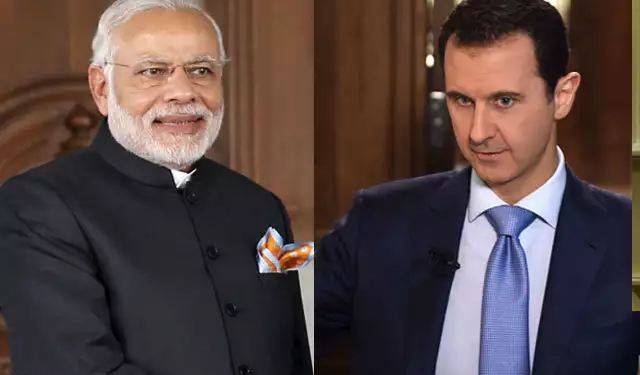According to latest reports, Syria has welcomed India’s recent statement condemning the “unilateral military offensive” launched by Turkey in North-east Syria. Syrian Ambassador to India Riad Abbas said that his country is grateful to India for its support. He said, “India’s support has always been there for Syria… India has helped us with medicine, defence scholarships. We see India as a strong government, which has a strong voice in the international fora.” On the issue of Pakistan backing Turkey, the envoy said, “Turkey supports terrorism, and terrorist groups in Syria, and all who support Turkey thus end up supporting terrorism.”
Modi government’s diplomatic offensive against Turkey therefore seems to have resonated pretty well with Syria leading to further strengthening of relations. Turkish President Erdogan had made objectionable remarks about the Kashmir issue at the UNGA at a time when the entire community of nations had come out agreeing that abrogation of Article 370 is India’s internal issue. In what was seen as quiet diplomacy, PM Modi had met the Cyrprus President and the Armenian Prime Minister. Both the countries share embittered relations with Turkey. Now, by taking a firm stand on the Turkish invasion, Modi government has shown that it is not going to remain mum in face of Turkey’s misadventures in Syria. The Syrian dispensation is clearly impressed by this stand. India and Syria share close bilateral relations anyway and this development only leads to further strengthening of the relations between the two countries. Relations between the two countries started thriving during the Vajpayee era.
Former Prime Minister, Late Atal Bihari Vajpayee had visited Syria in November 2003. The visit had turned out to be a groundbreaking development as the two countries signed nine agreements across several sectors during that visit. Centre for Biotechnology was also established in the Syrian Capital, Damascus with Indian technical assistance. Other significant developments were a grant of 1 million US Dollars and extension of a line of credit of 25 million US Dollars to Syria. India has extended several lines of credit since then that has continuously strengthened the bilateral relations between the two countries. Even though the size of the Indian diaspora in Syria is rather miniscule due to the ongoing crisis in Syria, the two countries have shown signs of greater cultural engagement. In April 2017, Indian cultural week was observed in Damascus and Latakia, where Bollywood movies were screened and Indian publicity material and books were also displayed. The cultural engagement opened up the two countries for greater bilateral co-operation even as Syria gradually moves towards a return to normalcy.
Syria’s partially secular credentials also give it a distinct identity in the Middle East and a natural option for India to engage with. Though Syrian Constitution does not proclaim it to be a purely secular State and in fact makes Islam the State religion, it does guarantee freedom of faith. It also allows performance of religious rites subject to the consideration of public order. The 2012 Amendment to the Syrian Constitution further makes it incumbent upon the State to respect all religions. Rojava, the de facto autonomous Northeastern region of Syria, had introduced secularism in the strict sense of the term and several progressive moves were made such as inclusion of civil law in personal status, proclamation of absolute equality of women under the law and a ban on forced marriage as well as polygamy. Moreover, child marriage was also made unlawful.
Earlier this year, the Modi government showed signs of greater engagement with Syria. India sess Syria as an ally in strategically crucial West Asia. Modi government which has been instrumental in expanding India’s presence and influence across the world, is now looking forward to forging closer ties with Syria by helping the country in rebuilding its infrastructure. As per the European Union, Syria would require $245 billion to revive its economy. This opens up massive potential for India to engage with Syria with reconstruction projects. India is eyeing such reconstruction projects across a range of sectors, viz., housing, power, textile and food. Moreover, India is also looking towards bilateral co-operation in counter-terrorism and information sharing mechanism with Syria given the country’s experience in fighting ISIS.
As stated earlier, the relations between the two countries have continuously evolved ever since engagement started in a big way during the Vajpayee era. India has supported the Assad regime in its fight against the ISIS. The two countries also support each other when it comes to the issue of sovereignty and territorial integrity with India extending its strong support for the sovereignty and territorial integrity of Syria ans Syria supporting India over the issue of Kashmir at all supranational forums. With PM Modi’s outreach and signs of a specific course of action for effective bilateral engagement, the two countries are well placed towards emerging as close strategic allies in the near future.

























